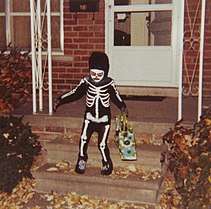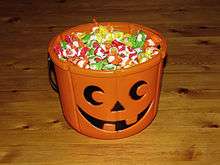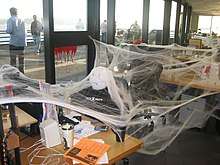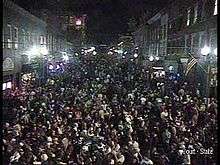Halloween
Halloween is a secular festival which occurs annually on October 31st. While it does have some origins in Catholic traditions, it is neither a religious occurrence, nor a government-recognized holiday where shops and offices are closed. Primarily a North American event, it has in recent years spread to other English-speaking countries, and a bit beyond. Activities usually happen in the evening and at night, involving both the playful and the scary. Depending on the type of Halloween you want, you could have a leisurely excuse to eat candy and dress up like a pirate or a chilling night out touring haunted houses and watching horror films until dawn.
It should not be confused with the Day of the Dead festival, which has different traditions and extends into early November.
Understand

The name "Halloween" is a contraction of All Hallows' Eve, from a Christian superstition (some centuries back) that all the ghosts and other strange things would come out on the night before All Saints' Day. Some claim the holiday's origins go back to ancient Celtic harvest traditions, such as the Gaelic festival of Samhain (saw-hayn). Despite its early connections to religion, only a very small minority of Christians or neo-Pagans consider Halloween a religious occasion today; it has become an almost purely secular event (occasionally, Christians will boycott it altogether or hold alternative festivals at a church)
Costumes play a big role. Originally, people would dress up as the various scary things that would allegedly be out and about that night—ghosts, werewolves, stereotypical witches (pointy hat, black dress, perhaps warts), and so on—but now the range of costumes is far wider, incorporating modern popular culture. For example, in 2016 Canada's Prime Minister and his wife dressed as Han Solo and Leia from Star Wars. The tradition has also turned away from homemade getups and more towards store-bought costumes, but extra praise is often given to those that craft their own outfit. Children typically get most excited about portraying their favorite superheroes or princesses, while adults may make their own extremely elaborate and sometimes costly get-ups.
The key Halloween activity is Trick-or-treating. In this tradition, kids don their costumes and knock on doors around their neighborhood and say, "Trick or treat!" when a resident answers. In return, they are given candy or other treats (or money, in some cultures). Some households will leave a bowl of candy outside with an often disregarded sign asking kids to "please take one." The "trick" part of the phrase offers a warning if there is no candy provided; this is often an empty threat. In more rural areas, and even some suburban areas, supervised "trunk-or-treat" events are organized by local community groups and held in parking lots, with the candy given out of the back of decorated cars. Trick-or-treating exists in Scotland and Ireland in the form of "guising", a similar tradition. In almost all areas where trick-or-treating is practiced, the activity is exclusively reserved for children, and parents often wait behind as their kids run up to a door.
The occasional good-natured neighbor will hand out a healthier alternative like apples, floss, or small plastic toys. There are many urban legends about poisoned candy or apples with razor blades in them—and a few hoaxes concocted by the supposed victims or a family member. None of the rare documented incidents (a California dentist distributing laxatives in 1959, a grouchy old lady handing teens steel wool, dog biscuits and ant poison in 1964 in New York—all clearly labelled as such—and one Minneapolis man criminally charged for hiding needles in Snickers bars in 2000) have caused death or permanent harm. Nonetheless, the Halloween witch with the poisoned apple is all part of the legend. The night before Halloween (sometimes called gate night, trick night, mischief night, cabbage night, goosy night, devil’s night, or devil’s eve, depending on your region) is a notorious night for mid-level mischief: it's possible that you will get a smashed pumpkin, some eggs thrown at your house, or some toilet paper thrown into your tree.
Costumes are also common for adults, even if trick-or-treating is not. Some people wear a costume to work that day, and costume parties—in homes, in bars, and on college campuses—are common in the evening or on the weekend before, known as "Halloweekend". Some charitable organizations have costume balls as fundraising events. This is the one day out of the year where you can go anywhere dressed as a clown, cowboy, or monster without anyone batting an eye. In the United States, except for very formal or professional events, you can walk around dressed as goofy as you please.
Do
Quite a few bars host events on Halloween or on the days before. Many, at least, will have specials on drinks like 'witches brew'. They may encourage staff or patrons to come in costume, and some offer prizes — anything from a free drink up — for the best costumes. This is especially common for bars that cater to groups that are inclined to unconventional clothing, such as hippie types, goths, cosplay aficionados, or drag queens.
Some cinemas schedule horror movies for Halloween. Classics like Dracula or Frankenstein are common choices, as are more recent films like Friday the 13th or Halloween. Most new-release horror films come out in the weeks before the holiday as well. If you enjoy the genre, it is worth checking local listings wherever you are in late October.
A common event that occurs around the holiday is showings of the the 1975 cult classic The Rocky Horror Picture Show. Many cities have a theater that shows the movie year round, from once a month to weekly, most often on Saturdays at midnight, and the number of showings usually increases around Halloween. A troupe will often "shadowcast" the film, standing on a stage in front of the screen, wearing replicas of the characters' outfits and lip-syncing the film. Audience interaction is encouraged and expected, and props are sometimes given out before the movie. The movie itself is incredibly unique and may not be for everyone, but the experience of this event alone is worth it. Check local listings for showings.
Some places are reputed to be haunted, and these are likely to have special events for Halloween. Many tourist areas also have "ghost walks" that emphasize allegedly haunted locales. Similarly, though less authentic, many places will operate seasonal "haunted houses" set up in temporary locations, with scare actors in hiding, just waiting to startle unsuspecting visitors. See our region and city articles for details.
Farms that operate hayrides and corn mazes during the fall/autumn season may switch to a Halloween format, such as haunted barns and nighttime hayrides, during the weeks leading up to Halloween. Some of these events (such as "Knott's Scary Farm" at Knott's Berry Farm in California or "Haunting Season" at Saunders Farm near Ottawa) have been run annually for decades, becoming more elaborate every year. See our region and city articles for details.
United Kingdom
- Halloween events from English Heritage: October. At various locations, explore the mysterious and macabre side of some of England's most historic properties. Not only are there family events at selected locations, but some age-restricted 'After Dark' events for braver adults. Booking is essential for specific events (use the link to find events near you), but recommended in any event.
- Halloween events by the National Trust: October. The National Trust has organised a number of Halloween events for families, and a few for those adults that can cope with a darker tale! Venue admission charges may apply in addition to those for events. Booking is essential for specific events (see link), but recommended in any event.
United States
.jpg)
- Festival of the Dead: TBA October 2019 Salem. (date needs fixing)
- Halloween in Sleepy Hollow: TBA October 2019 Sleepy Hollow. The home of the Headless Horseman goes all out for Halloween, with haunted hayrides, live music, street fairs and more. Lantern tours provide looks at the old cemetery, and near-daily live readings of Washington Irving's "The Legend of Sleepy Hollow" are quite the experience. The centerpiece, of course, is a haunted experience with the Headless Horseman himself. (date needs fixing)
- Little 5 Points Halloween Festival and Parade: TBA October 2019 Atlanta. A street arts festival with a costume parade at 4pm down Euclid and Moreland Ave in the Little 5 Points neighborhood. (date needs fixing)
- New Orleans Halloween Parade: TBA October 2019 New Orleans. Costume parade begins at 6:30pm, with associated events throughout the night. (date needs fixing)
- : 31 October 2019 Los Angeles. Santa Monica Boulevard between Doheny Drive and La Cienega Boulevard plays host to one of the larger West Coast Halloween events, with street vendors, music, and a parade. 6–11pm, Free, but this event is not suitable for children or pets. There is an alcohol free policy in the carnival streets and immediate vicinity, but many bars and clubs in the wider neighborhood will be running their own parties.
- Village Halloween Parade: 31 October 2019 New York City. The costumed come out to parade down Sixth Avenue (from Spring Street to 16th) in Greenwich Village! 7-11pm, free to watch and free to join, but streets on the Parade route can get crowded, and you should definitely use public transport. Organizers have a history of imposing a zero tolerance policy on alcohol. If you want to join the parade, see the link to find line-up details.
Theme Parks
Many theme parks and resorts host Halloween events during the months of September and October. They range from the family-friendly and fun to the scary and thrilling. Some of the largest are listed below.
- Disney's Halloween events: Five of Disney's resorts across the globe host Halloween events.
- Disney's Halloween Festival at Disneyland Paris has daytime activities and events for all guests, and a limited Halloween party in the evening requiring special admission.
- Disney Halloween Time at Hong Kong Disneyland includes a special parade as well as a The Nightmare Before Christmas walkthrough attraction.
- Halloweentime at Disneyland in California occurs at both theme parks in the resort, with a famed The Nightmare Before Christmas overlay to The Haunted Mansion ride, and is included in the regular park admission.
- Mickey's Not-So-Scary Halloween Party at the Magic Kingdom in Walt Disney World in Florida features in-park trick-or-treating, a special parade, and exclusive fireworks, and it requires special admission.
- Both theme parks at the Tokyo Disney Resort, as well as the new Shanghai Disneyland, host some Halloween events included in regular park admission.
- Fright Fest at Six Flags theme parks: Chain of various regional theme parks across the United States that hosts generic haunted houses and scare zones around the parks. A more affordable way to get your screams out, as these parks often run about half the price of Universal or Disney's U.S. parks, and the Halloween events are included in regular park admission. More information on the parks can be found in the local articles below of each respective theme park.
- Halloween Horror Nights at Universal Studios: Held at each of their four resorts around the world, typically running from mid-September to October 31. Various elaborate houses and "scare zones" are set up, and the line-up changes every year, usually including some popular movie and television franchises. Recent haunted house themes have included the films Poltergeist and Halloween, and the TV series The Walking Dead and Stranger Things. Costumes, masks and children under 13 are not allowed, and it requires special admission. See Universal Orlando (Florida), Universal City (Hollywood), Singapore-Sentosa and Harbourfront, and Osaka-Bay Area for more details.
Buy
Like every other holiday and season, Halloween has been commercialised and monetised by various vendors. Among the most common items sold are:
- Costumes. While it's possible (with a little skill and imagination) to make an original Halloween costume, many take the easy way out – buying a pre-made, mass-produced garment from a mainline discount store, a bricks-and-mortar costume shop or an online mail order vendor. If you go this route, it's still necessary to choose your costume well in advance (verifying well in advance that the costume fits and no accessories are missing) as the inevitable annual rush of last-minute orders means that you may find a limited selection still on store shelves by Oct 30 and that last-minute e-commerce order might not arrive before the big day at all. Most retailers impose a cut-off date for orders to avoid Halloween costume parcels arriving in early November and a restrictive return policy to prevent buyers from purchasing seasonal items and returning them after the season is over.
- Candy. If you're travelling, you won't be at home to hand out goodies to trick-or-treaters, but otherwise expect to be pressured to buy large quantities of small, individually-packaged sugary junk food items to shell out on Halloween.
If you intend to party on Halloween, you may end up purchasing event tickets. All of the usual warnings about event scams and counterfeit or bogus tickets apply to seasonal events.
Eat

- You've carefully hollowed out a pumpkin and carved the face of a jack-o-lantern; now what to do with all the leftover bits? The obvious would be to bake a pumpkin pie but a quick search for "pumpkin recipes" finds a multitude of options to use pumpkin (as a squash) in bread, tarts and a range of other baked goods.
- You'll also likely see plenty of leftover seasonal candy at marked down prices in dollar or discount stores the day after Halloween is over.
Stay safe and respect


Halloween is about having a good time and some safe (stage managed) scares. Real scares such as injuries, accidents or crimes are in no way conducive to this, and pushing someone too far can have physical and legal consequences. Organized events will typically have rules, and these should be adhered to.
Trick-or-treating is typically a harmless activity and fun for all concerned, but some parental supervision is required. Some kids might gorge on candy and become hyperactive from an overdose of sugar, and for others the loot must be carefully checked to ensure they do not eat something that they are allergic to. There are occasional incidents where older kids bully younger ones to steal their candy. As always, accepting gifts from strangers comes with some risk, so it's worth inspecting any treats you get before ingesting them. As trick-or-treaters are on the street soon after dark, there's also a possible risk of being struck by a motorcar, which can be minimised by being visible and choosing a costume that does not obstruct the eyes or vision.
Owing to concerns about anti-social acts carried out under the guise of so-called Halloween "pranks" in past years, you may encounter a reluctance amongst some stores and retailers to sell certain items in bulk around Halloween. Examples of items that have been restricted include laser pointers, paint, household chemicals, spray cans, flour, and eggs. Detroit has a pattern of imposing curfews on teens and restrictions on the sale of petrol in portable containers on the nights leading to Halloween, deploying large numbers of volunteers to report arson and suspicious activity to police.
And yes, you could be the recipient of a pranking yourself — these are rarely serious but can definitely ruin your good time.
See also
- Day of the Dead, a Mexican festival that happens the next day
- Fringe phenomena
- Horror fiction